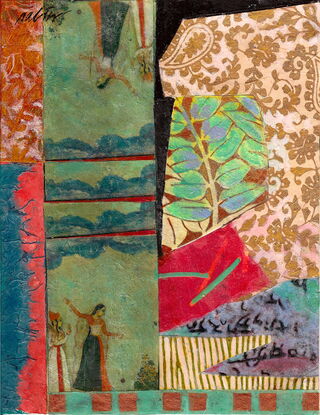"At the heart of each of us, whatever the imperfections...exists a silent pulse of perfect rhythm...which connects us to the universe." –George Leonard
Only art penetrates…the seeming realities of this world. There is another reality, the genuine one, which we lose sight of. This other reality is always sending us hints, which without art, we can’t receive.” –Saul Bellow

A commonly held belief about being mindful in our relationships, attributed to Zen philosophy, is to have a "beginner's mind," especially when dealing with conflicts. This is no easy task, given that we are dealing with a multitude of increasingly adversarial standoffs threatening us and our world. Most individuals try to avoid conflict, or at the least view it negatively. Like the weather, everyone talks about it but seldom agrees on how to deal with it. The beginner's mind is meant to initially understand how nature works, which, in essence, is the yin/yang process where conflict is neither good nor bad, it just is.
Any artist will attest to that special moment when a piece of art takes form, a result of tension and insight. Michelangelo described how he saw a beautiful statue in the dirty slab of marble he carted to his studio. This is because the map is not the territory; like a word is not the thing it describes, what exists in real life is quite different from how we think of it. One has to courageously embrace the aesthetic terrain, the human metaphor for nature which is full of many wonderful outcomes that result from the process of creative conflict. To do so is an embodiment of all that is simultaneously beautiful and messy.
Nature itself evolves by dissolving what we perceive as opposites. It provides an opportunity for learning how to go beyond double binds, creating wider perspectives that transcend challenges. What we can learn is to embrace conflict. To do so depends on an emerging curiosity, where the eventual tending to the needs of others is paramount, as opposed to settling for business as usual. It's a process of continuous collaborative learning, re-learning, exploring, and improvising.
It is we humans, pushing too hard on the many component parts of nature, that produce problems such as climate issues and political discord. This happens by not acknowledging how the many variables that make up the problems we face strive to interrelate and avoid barriers. The barriers? Fragmentation, disconnection, and miscommunication between various institutions.
The takeaway of the ecology movement and Rachel Carson’s book Silent Spring is that what lies in between these parts of our world holds the key to mitigating our survival. There is no such thing as not having conflict; however, we have choices to recognize how to embody a way of harmony. We have the choice to allow relationships to exist in the context of collaborative sharing, such as interdisciplinary research and the implementation of integrative actions in education, medicine, food production, etc. Expanding the consequences of any win-win exchange influences wider contexts, all of which are interdependent and hold secrets of a saner, aesthetically imagined world.
How can this manifest on the human level?
The answer is in our moments of mutual learning and listening to each other’s stories. Every snowflake is different, as are our fingerprints. There is an infinite amount of shared opportunity to dissolve perceived opposites and their resulting polarization. Doing so goes beyond power, labels, ego, and hierarchical frameworks that offer little mutual decision-making and grassroots input on the needs of different socio-economic groups. Yes, there need to be rules of kindness and respect to sustain a win-win outcome, however, if there is validity that conflict is the grist for creation. What will emerge from pausing, listening, and acknowledging will be the basis of a new direction in our evolution.
There is a natural, biological tendency for humans to synchronize when truly communicating.
All systems eventually fall towards disorder, yet they can be maintained in a way that respects desired differences. Dialogue creates wider, all-encompassing contexts that exist at the same time, in a part-to-whole process that can be described as "transcontextual." That is not to say that systems cannot be dysfunctionally maintained; we only have to look at the consequences of narrow, linear thinking, which distorts information to produce unequal distributions of wealth, poverty, war, discrimination, and environmental problems. These are the consequences of decisions made in isolation, with little collaborative processes.
Like a watch with a bent gear still working but telling the wrong time, systems can be painful. But with the intent of understanding how we are interdependent, we can blend with nature in an ecological part-to-whole manner, producing less adversarial and more respectful outcomes that meet the needs of a healthier world. This frees us to evoke and evolve collaboratively. It is how the Greeks described Gaia (Earth) as being more than the sum of its parts.
Is it time to listen and care for each other through non-adversarial forums that go beyond imposed fragmentation and pseudo separateness? What is the pattern that produces polarization and imposed opposites? How can we not share concerns and attempt to enlighten those who feel they have nothing to lose? Is there an opportunity to listen and synchronize through the common needs of emotional and physical survival? In what ways can mutual learning enhance our relationships? How can we avoid the injuries of environmental, cultural, and racial discord? How can we strive to tend to and care for each other?
"conflict" - Google News
September 13, 2022 at 03:30AM
https://ift.tt/M29e1SR
The Purpose of Conflict - Psychology Today
"conflict" - Google News
https://ift.tt/2Csag9I
https://ift.tt/4fakCjo
Bagikan Berita Ini














0 Response to "The Purpose of Conflict - Psychology Today"
Post a Comment